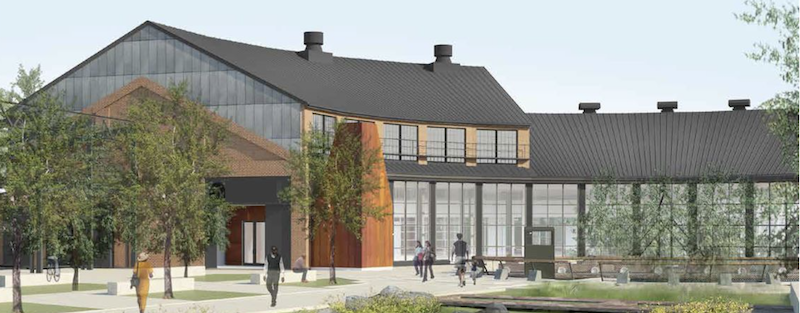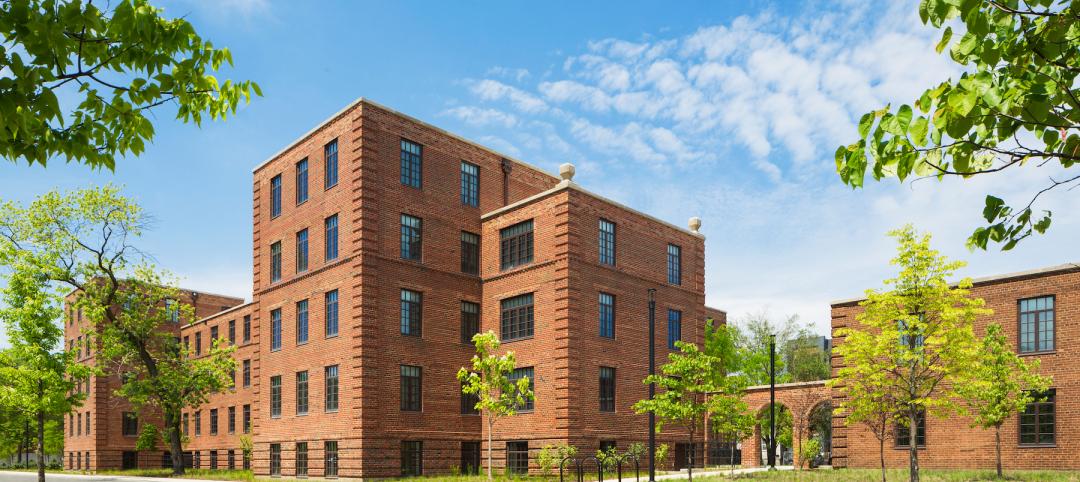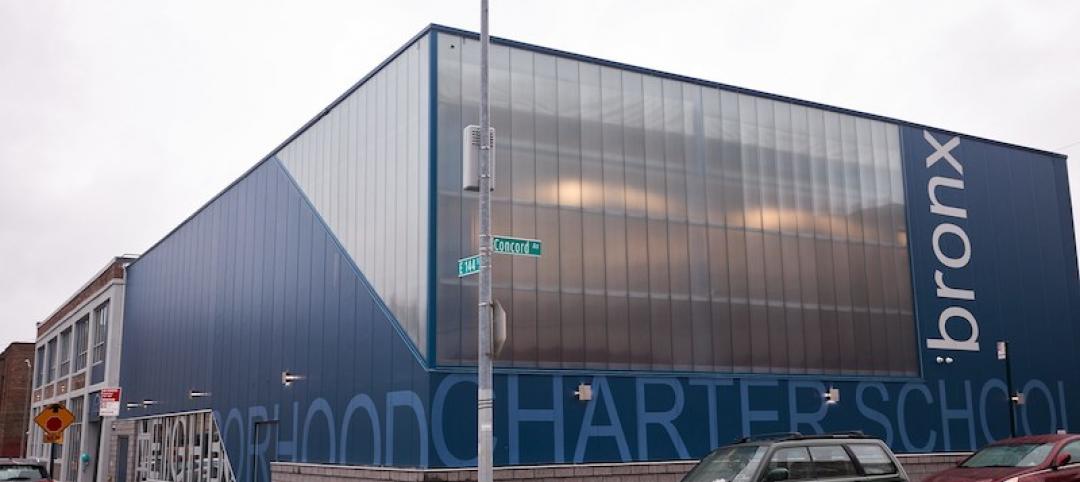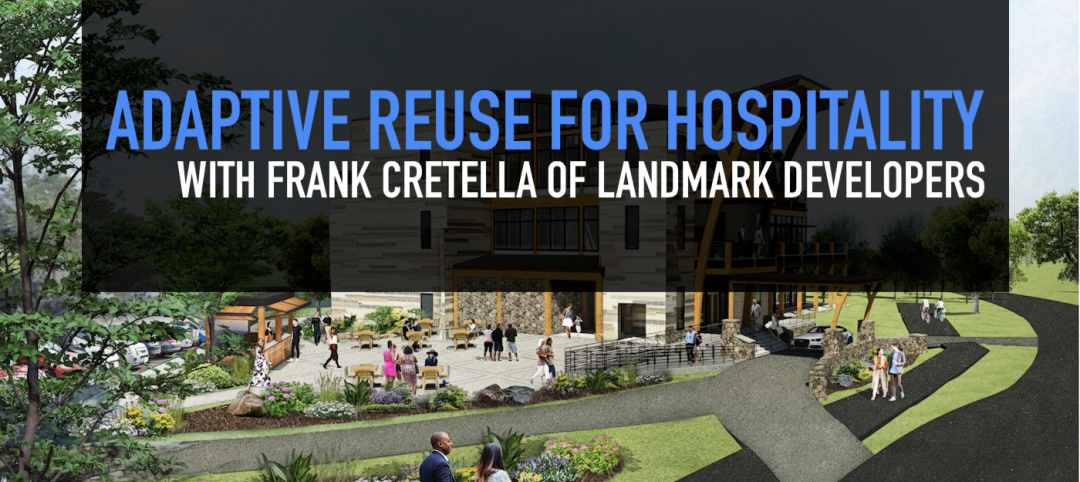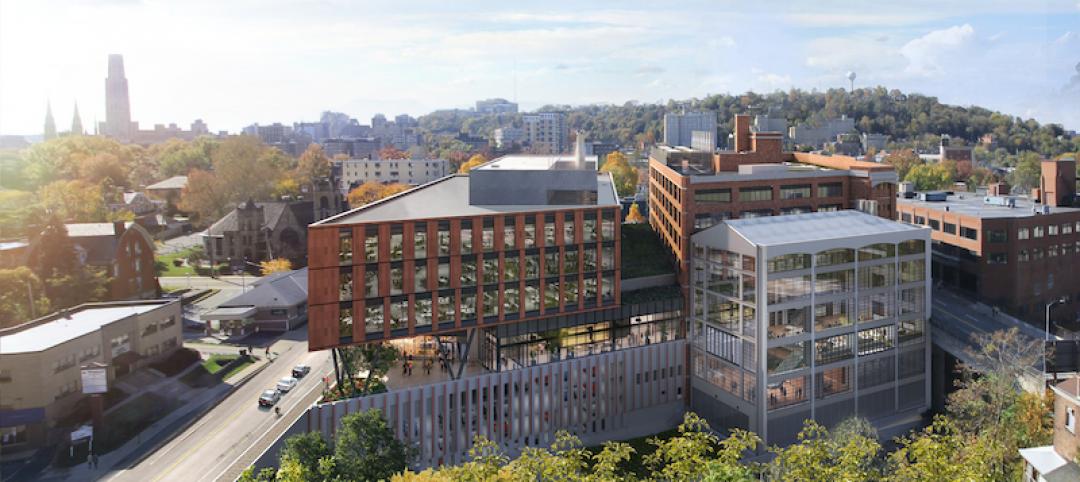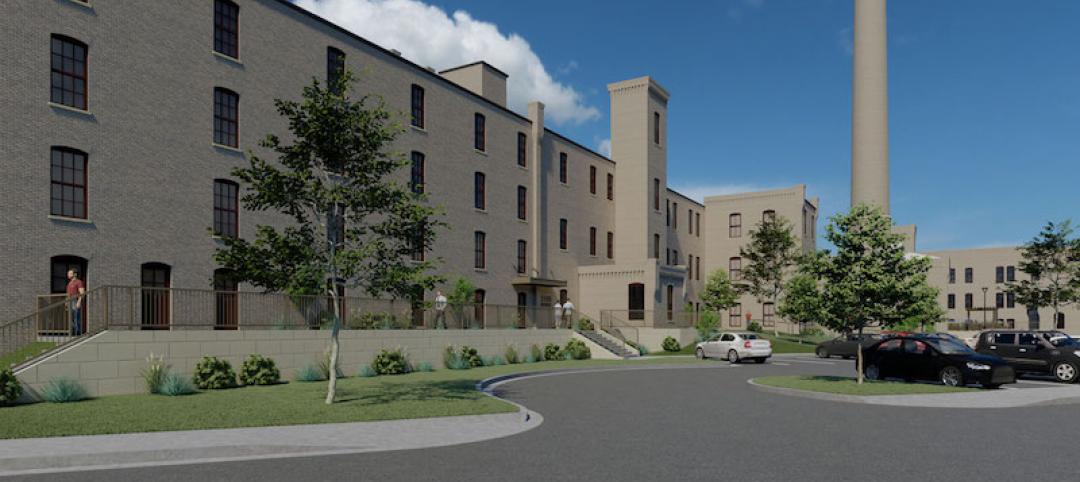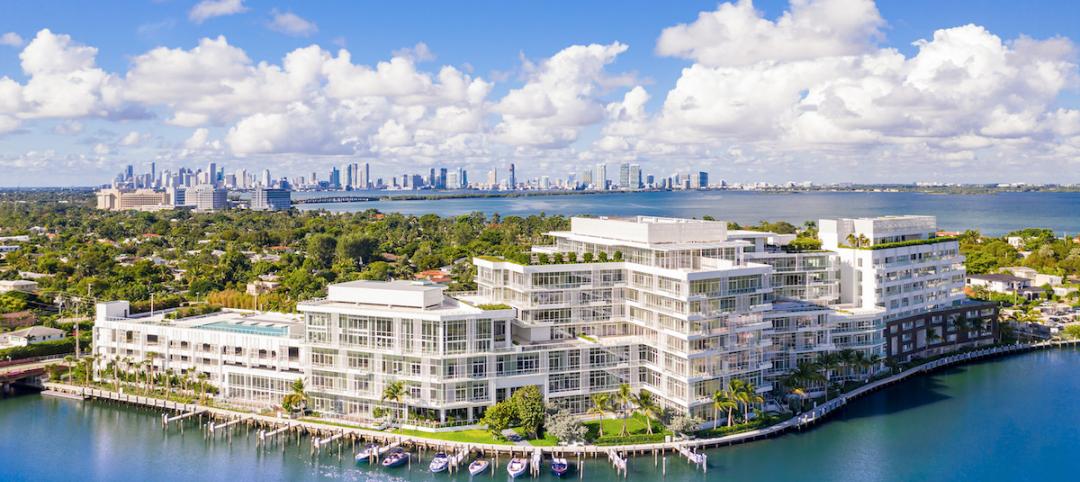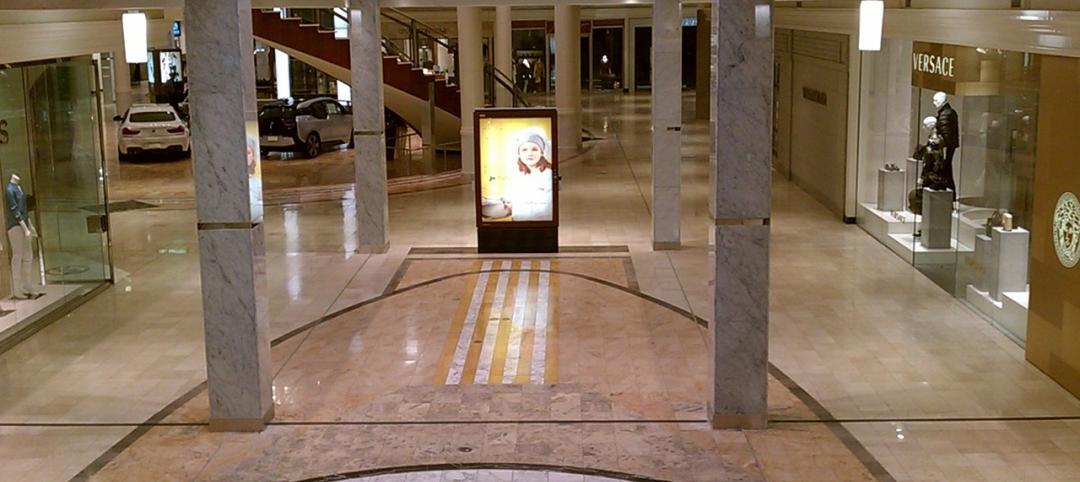A progress report on Hazelwood Green, the 178-acre redevelopment project in Pittsburgh, finds its current stage focusing on exterior amenities.
The redevelopment team led by Almono LP—an investment partnership of the Richard King Mellon Foundation, the Heinz Endowments, and the Benedum Foundation—has designed, funded, and completed a two-acre Plaza north of Mill 19, the quarter-mile-long skeleton of a former steel mill that sits on 12.6 acres of Hazelwood Green’s riverfront acres and, in its post-industrial reincarnation, offers 264,000 sf of rentable space to 21st-Century oriented manufacturing and automation tenants.
The plaza will serve as the civic heart of Hazelwood Green. It includes gardens, lawns, trees, and native vegetation, as well as a solar canopy, a tiered water feature, and hardscape surfaces for events and other uses. (Almono has engaged a team led by the urban planning firm Street Plans to devise and execute the plaza’s programming.)
Almono is also working with the Pittsburgh Parks Conservancy on placing a tree nursery on-site. That nursery would include tree species that mitigate air pollution, and a meadow with seating options.
In concert with agencies that include the Pennsylvania Environmental Council, Almono is working on a master plan to improve accessibility to a 1.2-mile stretch along the riverfront. Also in the works are several mobility initiatives that include coordination with Pittsburgh’s Office of Public Art to engage local designers and fabricators to add eight bus shelters to the site. (RFP responses are due next month, with the goal of installing the shelters later next year.)
Almono and the city want to add curbside charging stations for electric vehicles, and Almono has entered into an agreement with Healthy Ride to install a bikeshare station at the plaza by next spring.
A NEW PLATFORM FOR ENTREPRENEURS
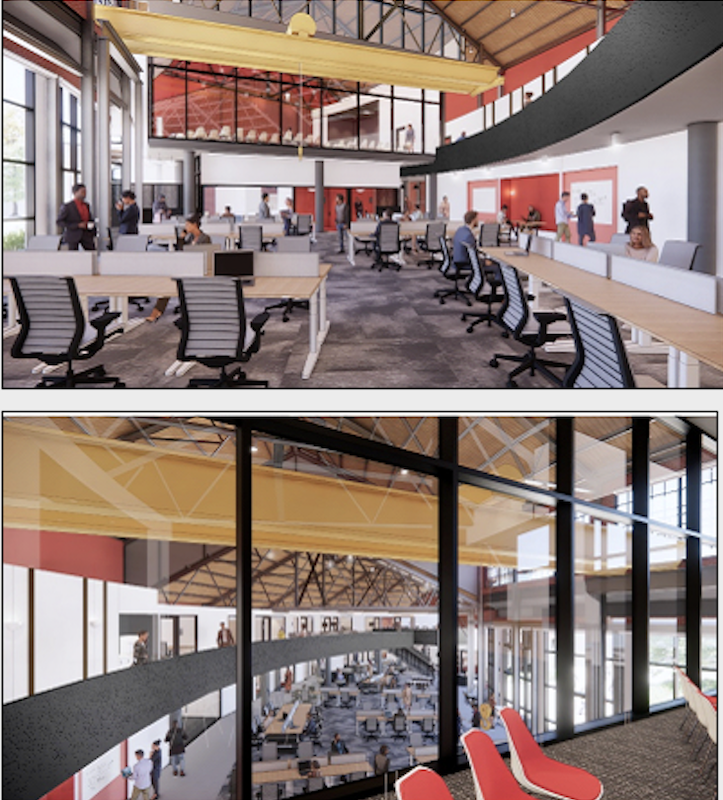
The Roundhouse's interior will have ample collaborative spaces for entrepreneurs.
The Hazelwood Green redevelopment is also proceeding with the adaptive reuse of existing buildings on-site. This spring should see the completion of the reconstruction of the Roundhouse, which dates back to the late 1880s, and once was used to stabilize train engines for servicing. This building is getting a $12.5 million rehabilitation and will re-emerge as the 26,000-sf home to an innovation center for OneValley, a global entrepreneurship platform formerly known as GSVlabs.
“The Roundhouse communicates its industrial origins, and when you are in the space, you recognize that it carries with it the memory and residue of over 100 years of 20th-Century activity and life,” says Anne Chen, principal with GBBN, this project’s architect and interior designer. “The design vision for this remarkable building has focused on connecting to its important role in Pittsburgh history while repositioning the space to usher in a new future of community enrichment, technology, manufacturing and entrepreneurialism.”
Other firms on the Roundhouse project team include WBCM (SE), Buro Happold (MEP), LaQuatra Bonco (landscape architect), KU Resources (CE), evolveRA (LEED management), PJ Dick (CM), and Grand View Development (owner’s rep). U3 Advisors, the development advisor for Hazelwood Green, has also been involved in the Roundhouse remake.
The Roundhouse’s original turntable surface is being repurposed to function as an outdoor relaxation space with wheeled seating on the rails. The building’s original bridge crane was recently rehung in the space. Overhead engine bay doors are being replaced with a glass curtainwall system to bring natural light into the building.
BIG PLANS OVER THE NEXT TWO DECADES
Local small manufacturers and artisans, working with the custom fabricator Monmade, have been engaged to design elements of the Roundhouse that include signage, interior lighting, wall tile, custom benches, and sliding doors.
Almono is seeking LEED Gold certification for the Roundhouse, whose stormwater management includes the use of bioswales and a large rain garden to keep and filter water on site.
Over the next two decades, Hazelwood Green’s redevelopment plan calls for 31 acres of open public space, 3,500 housing units, and 4.4 million sf of commercial building space.
Related Stories
Multifamily Housing | Oct 21, 2021
Chicago’s historic Lathrop public housing complex gets new life as mixed-income community
A revitalized New Deal–era public housing community in Chicago brings the Garden City movement of yesteryear into the 21st century.
Adaptive Reuse | Aug 25, 2021
The first net-zero hotel in the U.S. is nearing completion in Connecticut
Solar arrays will provide the electricity for the Hotel Marcel, whose name recalls the building’s original designer.
Adaptive Reuse | Aug 13, 2021
Developers are repositioning vacant space as charter schools
Transwestern is working with the National Alliance of Public Charter Schools to provide a turnkey solution.
Hotel Facilities | Jun 18, 2021
Adaptive reuse for hospitality, with Frank Cretella of Landmark Developers
In an exclusive interview for HorizonTV, Landmark Developers' President Frank Cretella talks about the firm's adaptive reuse projects for the hospitality sector. Cretella outlines his company's keys to success in hospitality development, including finding unique properties and creating memorable spaces.
Adaptive Reuse | Jun 2, 2021
An old Ford factory in Pittsburgh is being adapted to become a biomedical research facility
This is the latest step in the city’s post-industrial resurgence.
Adaptive Reuse | Apr 15, 2021
The Weekly Show, Apr 15, 2021: The ins and outs of adaptive reuse, and sensors for real-time construction monitoring
This week on The Weekly show, BD+C editors speak with AEC industry leaders from PBDW Architects and Wohlsen Construction about what makes adaptive reuse projects successful, and sensors for real-time monitoring of concrete construction.
Adaptive Reuse | Feb 24, 2021
Adaptive reuse project brings co-living space to Los Angeles’s Hancock Park
Lorcan O’Herlihy Architects is designing the project.
Adaptive Reuse | Feb 14, 2021
Three adaptive reuse projects will add housing in Wisconsin
Historic tax credits helped pave the way, but preservation required creative solutions.
Multifamily Housing | Jan 20, 2021
Abandoned Miami hospital gets third life as waterfront condo development
The 1920s King Cole Hotel becomes the Ritz-Carlton Residences Miami in the largest residential adaptive reuse project in South Florida.
Adaptive Reuse | Oct 26, 2020
Mall property redevelopments could result in dramatic property value drops
Retail conversions to fulfillment centers, apartments, schools, or medical offices could cut values 60% to 90%.


